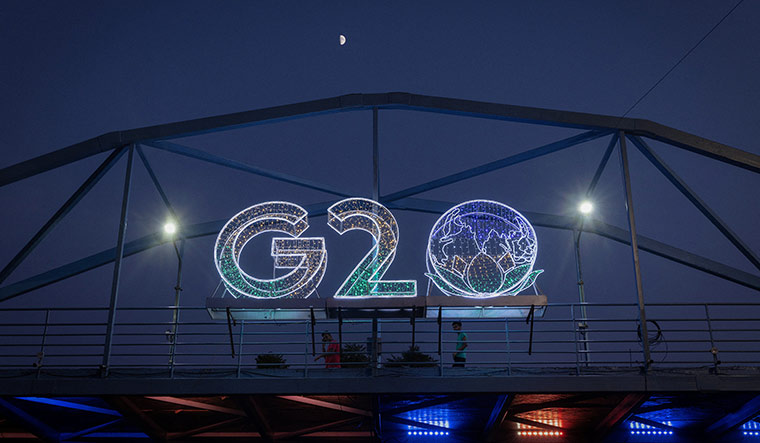India hosted the G20 Summit of 2023 in a manner that has lifted the status of G20 to a truly inclusive global grouping. 'Vasudhaiva Kutumbakam', which translates as 'One Earth, One Family, One Future' which was the summit’s theme, encapsulated everything that the G20 Summit of 2023 focused on.
Even till a very late stage during the summit, it was believed that in the backdrop of the position taken by the US and EU on Russia and the heightened geopolitical tensions among the major powers, a consensus would not be possible. Despite all this, the summit succeeded in getting various parties to tone down their differences and achieved a rare consensus in coming out with the New Delhi declaration.
The Delhi summit subtly shifted the G20’s focus on to the Global South and brought the African Union with 55 African nations into the G20 fold. This has transformed the orientation of G20 from an ‘Elite GDP Club” into to an all-inclusive and dynamic global body. In the backdrop of the geopolitical rivalries that have caused significant erosion of trust and faith in the global multi-lateral bodies, India manoeuvred successfully and salvaged the summit from becoming a flop and succeeded in enhancing G20’s relevance manifold and giving the forum a much-needed holistic global orientation.
With Global South assuming centrality, important issues such as the need for more inclusive growth, the need for accelerated actions to achieve UN Sustainable Development Goals and the assistance that the developing countries require for climate action and green development initiatives have gathered greater attention. Multilateral financing, debt vulnerabilities, digital public infrastructure, artificial intelligence (AI), and international taxation were some of the other important issues that engaged the attention of the participating countries during the summit.
The announcement of the India-Middle East-Europe economic corridor and global bio-fuel alliance were significant steps. India’s willingness to share its success in digital public infrastructure for the larger good and inclusive growth was well received by the global community.
With Brazil hosting the next summit, to be followed by South Africa, the new momentum, inclusivity and increasing relevance of the G20 holds out great potential.
In the Indian context, the government of India actually transformed the 2023 G20 summit in India from being just another multinational meet that the country hosted, into a national festival of sorts, creating a level of public awareness, hither-to-fore unknown for such events, touching every corner of the country, eliciting participation by large sections of population and making citizens stakeholders. India took full advantage of the opportunity to showcase itself to the world. Successful landing near Moon’s South pole by Chandrayaan - 3 provided the perfect backdrop for India’s G20 story.
Going beyond the achievements and ‘feel-good’ factor of the 2023 summit, the G20 faces immense challenges in its journey towards becoming an outcome-oriented, effective and relevant multilateral grouping; becoming equitable in addition to being more inclusive. It is important that these challenges be identified and analysed.
The changing dynamics of West Asia have the potential to cause severe fissures in the global community including the Global South. It could also cast its shadow on the India-Middle East-Europe Corridor. Although the Ukraine war has receded from primacy, it is becoming an increasing economic and geopolitical burden for the US and its Western allies. The war also poses significant economic and diplomatic challenges to the Global South. The big power rivalry and the ongoing geopolitical turmoil may also result in diversion and dilution of the developed world’s commitment towards climate action and other economic assistance to the developing world. This factor assumes greater criticality in the backdrop of G20’s ambitious target to triple global renewable energy by 2030, its commitment to climate justice and equity and G20’s acknowledgement that the developing countries require a whopping $5.9 trillion to meet their Nationally Determined Contributions (NDC’s) by 2030. These targets and goals are not mere desirable developmental aspirations, but critical, non-negotiable measures required for our sheer survival and to prevent the destruction of our planet. The entire climate action exercise will remain a non-starter without generous financial and technical support from the Global North and the world acting in unison.
The China factor will continue to manifest in every facet of geopolitics and cannot be wished away. China and the rest of the world need to find ways and means for collaborative development. In the short term, China’s policies to wean away developing countries facing economic distress and its efforts to expand BRICS need careful monitoring. Constructive engagement with China may be a better option for the G20 and the world at large, rather than pursuing a “selective outcast” approach towards it.
In an era where voice of the developing world and millions of global citizens still living in abject poverty are lost in the din of the great power rivalry and wars and the world staring helplessly at an irreversible climate crisis which is already upon us, the G20 - 2023 holds out a rare ray of hope for the global community.
(The author is a former deputy chief of army staff.
The opinions expressed in this article are those of the author's and do not purport to reflect the opinions or views of THE WEEK.)



